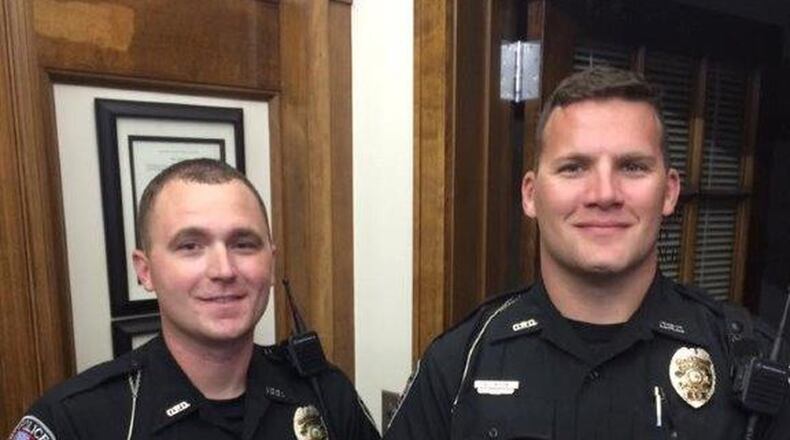Gilbert is married and is the father of two sons. His wife, Jill, pinned on his badge for the first time during the council ceremony as sons Brantlee and Bentlee watched.
Butler’s fiancé, Ashley, pinned on his badge.
The two men come from different experiences but both see the opportunity to work for the Oxford Police Department as special.
Gilbert worked for nearly nine years in sales after college but went back to his original dream of going into law enforcement following his father, the police chief of New Miami. Gilbert graduated from Northern Kentucky University with a degree in criminal justice but his father discouraged him from going into police work.
“He was able to reason with me. He saw all the stuff he missed because of his job when I was a child,” Gilbert said. “Out of college, I landed a sales job. I made more money but after nine years in sales I went back to wanting to be a police officer. He knew he could not remove that desire or ambition from me.”
Butler started college at the University of Cincinnati in engineering, but quickly decided that was not what he wanted to do and he joined the Army. He served for three years and 19 weeks, including 14 months in Iraq in 2008-09 as a combat engineer. That title has nothing to do with his previous college plan, he said.
“Combat engineers get rid of obstacles. We patrolled on routes to be sure there were no land mines or IEDs and cleared them out,” he said.
Back in the states and out of military life, he returned to UC, this time in a psychology program which led to social service work, first for Lighthouse working with youth and then Talbert House working with homeless veterans.
“Working with 18- to 24-year-olds just becoming adults and working with homeless veterans, I ran in the same circles in Downtown Cincinnati,” he said.
Working with Lighthouse brought him in contact with an outreach police officer whose job it was to serve as an advocate for young people with judges.
“I watched her attitude. She convinced me the way to make a big difference was in police work. With skills and attitude, you can make a difference,” Butler said.
He then went to work as a Hamilton County Corrections officer and attended the Police Academy on his own while working there.
Butler knew little about Oxford but his fiancé and many of her friends had gone to Miami University and he learned about the town from them.
Both officers applied for police openings at various places and both said they were happy when Oxford responded because they consider the town a special place.
Gilbert, who worked part-time for six months with the Mount Healthy Police Department before getting the call from Oxford said he likes the size of this town because it is similar to Richmond, Ky. where he went to college and plans to be here a long time. He said seven of his years in sales were spent with AT&T as an account manager, traveling over the area, often coming through Oxford and he knew this was where he wanted to be.
“Being older and getting into law enforcement, I knew it would lead to the gig I wanted. So far, it’s been wonderful,” Gilbert said. “I’m looking forward to starting and finishing a career in one location. I look forward to being able to help out in any way I can.”
He said the community has welcomed him and he appreciates that.
“Oxford has been more than I expected or hoped for. The community has been responsive to welcome me,” Gilbert said. “they have been very supportive. In today’s time, that makes a difference.”
Butler said he learned a lot from his time on plainclothes riding with a training officer and that confirmed his initial excitement about working in Oxford.
“I’m excited about Oxford, about a population I have not interacted with a whole bunch,” he said, adding the city provides an opportunity to deal with both a student population and permanent-resident population, providing an outlet for skills learned in his previous experience. “The same skills still apply. The motivation and how thought processes work are the same targets. It’s similar even though they are from vastly different backgrounds, in how to deal with them.”
He praises the training regimen of the city’s police department and feels it is preparing him for working in Oxford.
“There is a very extensive binder with tasks to complete, but, bigger than that, is the gamut of what you can expect,” Butler said. “There are a lot things you need to know.”
Both officers are now working with field training officers and will do so for a few more months in the department’s training program for new officers. First, they will ride, in uniform, watching and learning from their training officers. Next, they will take over driving the car and taking lead in dealing with calls with the training officer overseeing their work. The final step in the experience is to have the training officer ride along in civilian clothes, simply observing and making sure the new officer is ready to work alone.
About the Author
